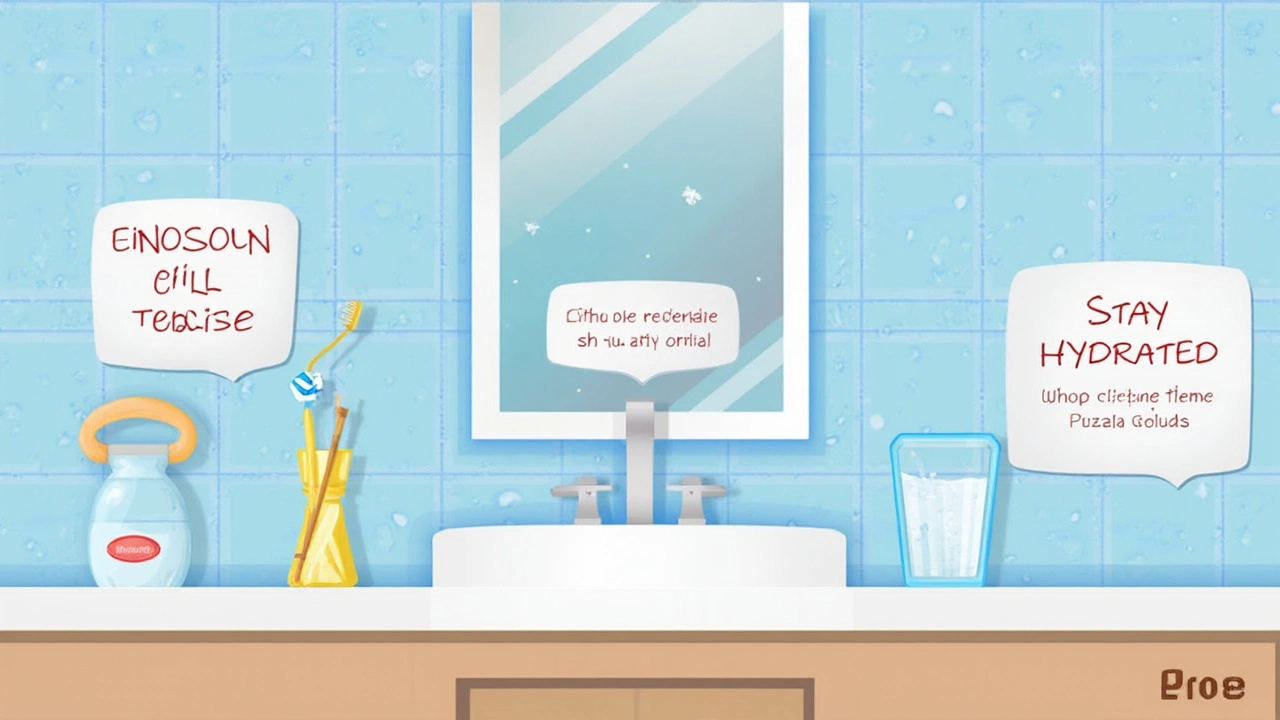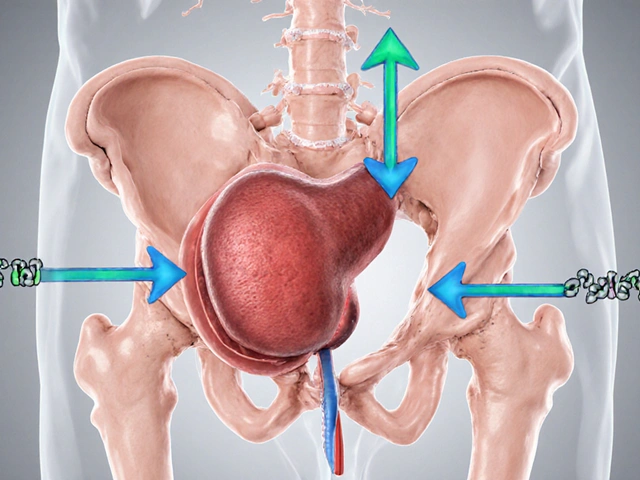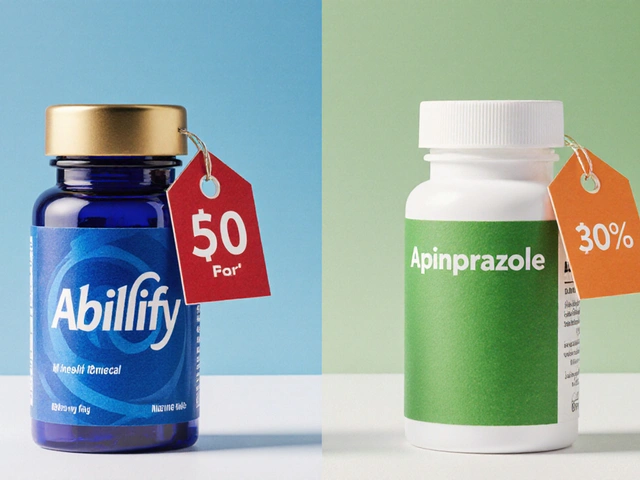
Clozapine is crucial for many battling schizophrenia, but did you know it can mess with your dental health? This medication can lower saliva production, leading to dry mouth, and that spells trouble for your teeth and gums. But don't worry, with the right techniques, you can keep your smile bright.
Here’s a straightforward way to combat the effects. First, hydrate like it’s your new hobby. Water not only keeps you feeling good but helps wash away lingering food particles that stick around in that dryer mouth of yours. And maybe think about a saliva substitute. They’re just as practical as they sound.
What about brushing? Twice a day with fluoride toothpaste and steady flossing are your best friends in this battle. They team up to remove plaque and prevent cavities, despite the battle clozapine wages on your saliva. So, grab that toothbrush and make it count!
- Understanding Clozapine's Impact on Oral Health
- Daily Dental Care Tips for Clozapine Users
- Why Regular Dental Checkups Matter
- Balancing Medication Benefits with Dental Concerns
Understanding Clozapine's Impact on Oral Health
When you're on clozapine, keeping an eye on your dental health can feel like an extra chore, but it’s worth it. Let’s break down why this medication can be a real game-changer for your mouth.
Why Clozapine Affects Your Smile
One biggie is its impact on saliva production. Clozapine can reduce the amount of saliva your mouth makes, leading to what’s known as dry mouth. Without enough saliva, you’re more likely to see an increase in cavities, gum disease, and bad breath. Saliva is your mouth’s natural cleaner, washing away food particles and helping neutralize acids from bacteria.
Real-Life Concerns
Folks on clozapine have reported a higher chance of oral diseases. Because of less saliva, plaque can build up faster, and without intervention, you might experience tooth decay and gingivitis. Some even notice changes in taste or a persistent metallic taste which, let’s face it, isn’t much fun at all.
Looking at the Data
To put it in perspective, studies have shown that nearly 30% of people on clozapine report a significant reduction in saliva. Here's a little snapshot to give you an idea:
| Saliva Reduction | Percentage of Clozapine Users Affected |
|---|---|
| Mild | 15% |
| Moderate | 10% |
| Severe | 5% |
Knowing these stats can help motivate you to keep up with oral hygiene. After all, being informed is half the battle!
Tackling the Impact
Adopting good oral habits is essential. Think of drinking water regularly, using sugar-free gum to stimulate saliva, and steering clear of sugary snacks as small but significant steps. And remember, if you’re having a tough time, your dentist can offer personalized advice to work around these challenges.
Daily Dental Care Tips for Clozapine Users
If you're taking clozapine, keeping on top of your dental health can help you avoid complications. Dry mouth is a common side effect, thanks to reduced saliva production, but with some smart habits, you’ll protect your teeth and gums.
Hydrate and Moisturize
Staying hydrated is crucial. Drink water throughout the day to help keep your mouth moist and rinse away food debris. Consider chewing sugar-free gum, which can boost saliva production, and look into saliva substitutes as a backup option to keep your mouth anything but dry.
The Brushing Basics
Brush your teeth at least twice a day using a fluoride toothpaste. Fluoride helps to strengthen tooth enamel, a key defense especially when your saliva can’t do its usual job. Don't forget to replace your toothbrush every three months or after an illness to keep it effective.
Supercharged Flossing
Flossing is more important than ever. Make it a daily routine to prevent plaque buildup. Flossing after meals is a bonus, but at least do it every evening. Consider adding an interdental brush for those tighter spots between your teeth.
Mindful Eating
Your diet affects your teeth, too. If possible, limit sugary snacks and drinks. Aim for a balanced diet with lots of vegetables and fruits, promoting good dental and overall health. Raw veggies can even act as natural toothbrushes, reducing plaque and freshening breath.
Checkups with Your Dentist
Regular dental visits are your secret weapon. Your dentist can catch early signs of cavities or gum issues common with clozapine use. Make sure to inform them about your medication so they can provide the best care tailored to your needs.
Track Your Progress
If you're curious about how your efforts are paying off, consider using an app to monitor your hydration and brushing habits. Keeping tabs will motivate you to maintain great oral care and spot areas for improvement.

Why Regular Dental Checkups Matter
Let's face it, regular dental checkups might not be the highlight of your month, but they definitely play a huge role in maintaining a healthy smile, especially if you're using clozapine. This medication can cause dry mouth, increasing your risk for cavities and gum disease. That's exactly why seeing your dentist regularly is more than just a routine—it’s a protective strategy.
Prevention is Key
At those dental visits, they're not just checking for cavities. They're catching small problems before they turn into big issues. Early detection can save you from the pain and hassle of more complicated dental procedures. Plus, who doesn’t love a good polish and clean that makes your teeth feel brand new?
“Regular dental visits are about more than clean teeth; they're a window into your overall health,” says Dr. Susan Taylor, a renowned periodontist. “Especially for clozapine users, maintaining oral health is critical.”
Expert Advice and Support
Your dentist can offer valuable tips tailored just for you. They know how medications affect your teeth and can suggest effective solutions to combat dry mouth or sensitivity. Sometimes a new mouthwash or an adjusted cleaning technique can make all the difference.
Spotting the Unseen
Many oral issues don't give off obvious signs until they're advanced. Your dentist uses specialized tools and skills to detect problems early on. They’ll spot decay or inflammation that you might miss, helping you tackle these before they become major headaches.
For some eye-opening numbers, consider this recent finding: around 60% of clozapine users experience some form of oral health issue. Visiting your dentist regularly can help keep you out of that statistic.
Balancing Medication Benefits with Dental Concerns
Taking clozapine is a game-changer for managing schizophrenia, but the journey comes with some dental bumps. Let's get real about balancing the benefits of your medication with those pesky dental issues.
On one hand, clozapine is super effective at controlling the symptoms that make life tough. Many folks see a significant reduction in hallucinations and delusions, leading to a better quality of life. However, the side effects, like a dry mouth, are not something to ignore.
Dry mouth, called xerostomia in the medical world, makes your mouth feel like a desert and can cause cavities and gum disease. Here's where we strike a balance: enjoying the peace from clozapine while keeping dental health in check.
Understanding the Trade-offs
First, talk to your psychiatrist and dentist about your specific situation. They might have some tricks up their sleeves to help minimize these effects. Sometimes, they can adjust your dosage or suggest alternatives.
Top Tips for Managing Dry Mouth
There are several simple daily habits you can adopt to manage dry mouth:
- Hydration is key. Drink water regularly throughout the day.
- Use alcohol-free mouthwash—it helps without drying out your mouth further.
- Chewing sugarless gum can increase saliva flow. Look for brands with xylitol.
- Consider saliva substitutes. These over-the-counter products can be lifesavers.
Your Support Squad: Dentists and Psychiatrists
Having regular appointments with both your dentist and psychiatrist is vital. They can catch potential problems early and make adjustments to your dental hygiene routine or medication if necessary. Prevention is always better than treatment.
Remember that you're not alone in this. Many people navigate the pros and cons of medications like clozapine every day. By staying informed and proactive, you can enjoy the benefits of your medication while maintaining that healthy smile.





Wendy Edwards
February 14, 2025 AT 16:40ugh i didnt even realize my dry mouth from clozapine was wrecking my teeth till i lost a molar last year. water all day now, sugarfree gum like its my job, and i swear by that xylitol spray from the pharmacy. no more metallic taste nightmare. you guys arent alone.
Jaspreet Kaur
February 16, 2025 AT 03:00clozapine saved my life but my dentist called it a silent thief. saliva is the body’s original mouthwash and when it’s gone you’re basically feeding bacteria a five star buffet. i dont brush harder i brush smarter. fluoride paste twice a day floss like its a religion and i chew gum while i watch netflix. small things big difference.
Gina Banh
February 16, 2025 AT 15:45stop using alcohol mouthwash. it dries you out more. use baking soda rinse or just plain water. also floss before brushing not after. that way you dislodge the gunk then brush it away. and yes saliva substitutes work. my dentist gave me a free sample and now i buy it in bulk. dont ignore this. your teeth will thank you.
Deirdre Wilson
February 17, 2025 AT 05:24i used to think dry mouth was just annoying till i started getting cavities like they were going out of style. now i carry a tiny water bottle everywhere like its my security blanket. sometimes i even lick my lips on purpose just to feel something wet. weird? maybe. effective? hell yes.
Damon Stangherlin
February 17, 2025 AT 14:55just wanted to say thank you for this post. i was scared to talk about my dental issues because i thought it was my fault. turns out it’s the med not me. i started flossing daily and my gums stopped bleeding. small win but it feels huge. you’re not broken you’re just medicated.